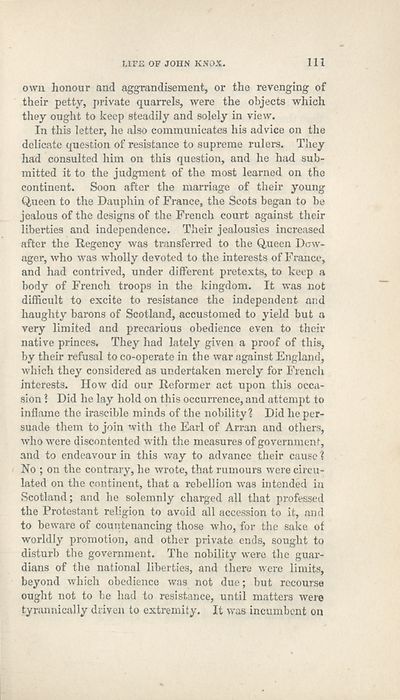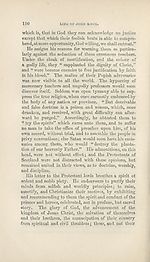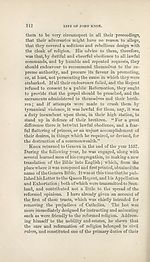Download files
Complete book:
Individual page:
Thumbnail gallery: Grid view | List view

LIFE OF JOHN KNOX. Ill
own honour and aggrandisement, or the revenging of
their petty, private quarrels, were the objects which
they ought to keep steadily and solely in view.
In this letter, he also communicates his advice on the
delicate question of resistance to supreme rulers. They
had consulted him on this question, and he had sub¬
mitted it to the judgment of the most learned on the
continent. Soon after the marriage of their young
Queen to the Dauphin of France, the Scots began to be
jealous of the designs of the French court against their
liberties and independence. Their jealousies increased
after the Regency was transferred to the Queen Dow¬
ager, who was wholly devoted to the interests of France,
and had contrived, under different pretexts, to keep a
body of French troops in the kingdom. It was not
difficult to excite to resistance the independent and
haughty barons of Scotland, accustomed to yield but a
very limited and precarious obedience even to their
native princes. They had lately given a proof of this,
by their refusal to co-operate in the war against England,
which they considered as undertaken merely for French
interests. How did our Reformer act upon this occa¬
sion ? Did he lay hold on this occurrence, and attempt to
inflame the irascible minds of the nobility? Did he per¬
suade them to join with the Earl of Arran and others,
who were discontented with the measures of government,
and to endeavour in this way to advance their cause 1
No ; on the contrary, he wrote, that rumours were circu¬
lated on the continent, that a rebellion was intended in
Scotland; and he solemnly charged all that professed
the Protestant religion to avoid all accession to it, and
to beware of countenancing those who, for the sake of
worldly promotion, and other private ends, sought to
disturb the government. The nobility were the guar¬
dians of the national liberties, and there were limits,
beyond which obedience was not due; but recourse
ought not to be had to resistance, until matters were
tyrannically driven to extremity. It was incumbent on
own honour and aggrandisement, or the revenging of
their petty, private quarrels, were the objects which
they ought to keep steadily and solely in view.
In this letter, he also communicates his advice on the
delicate question of resistance to supreme rulers. They
had consulted him on this question, and he had sub¬
mitted it to the judgment of the most learned on the
continent. Soon after the marriage of their young
Queen to the Dauphin of France, the Scots began to be
jealous of the designs of the French court against their
liberties and independence. Their jealousies increased
after the Regency was transferred to the Queen Dow¬
ager, who was wholly devoted to the interests of France,
and had contrived, under different pretexts, to keep a
body of French troops in the kingdom. It was not
difficult to excite to resistance the independent and
haughty barons of Scotland, accustomed to yield but a
very limited and precarious obedience even to their
native princes. They had lately given a proof of this,
by their refusal to co-operate in the war against England,
which they considered as undertaken merely for French
interests. How did our Reformer act upon this occa¬
sion ? Did he lay hold on this occurrence, and attempt to
inflame the irascible minds of the nobility? Did he per¬
suade them to join with the Earl of Arran and others,
who were discontented with the measures of government,
and to endeavour in this way to advance their cause 1
No ; on the contrary, he wrote, that rumours were circu¬
lated on the continent, that a rebellion was intended in
Scotland; and he solemnly charged all that professed
the Protestant religion to avoid all accession to it, and
to beware of countenancing those who, for the sake of
worldly promotion, and other private ends, sought to
disturb the government. The nobility were the guar¬
dians of the national liberties, and there were limits,
beyond which obedience was not due; but recourse
ought not to be had to resistance, until matters were
tyrannically driven to extremity. It was incumbent on
Set display mode to:
![]() Universal Viewer |
Universal Viewer | ![]() Mirador |
Large image | Transcription
Mirador |
Large image | Transcription
| Antiquarian books of Scotland > Scotland/Scots > Life of John Knox ; and, The life of Alexander Henderson > (129) |
|---|
| Permanent URL | https://digital.nls.uk/131833852 |
|---|
| Description | Thousands of printed books from the Antiquarian Books of Scotland collection which dates from 1641 to the 1980s. The collection consists of 14,800 books which were published in Scotland or have a Scottish connection, e.g. through the author, printer or owner. Subjects covered include sport, education, diseases, adventure, occupations, Jacobites, politics and religion. Among the 29 languages represented are English, Gaelic, Italian, French, Russian and Swedish. |
|---|

